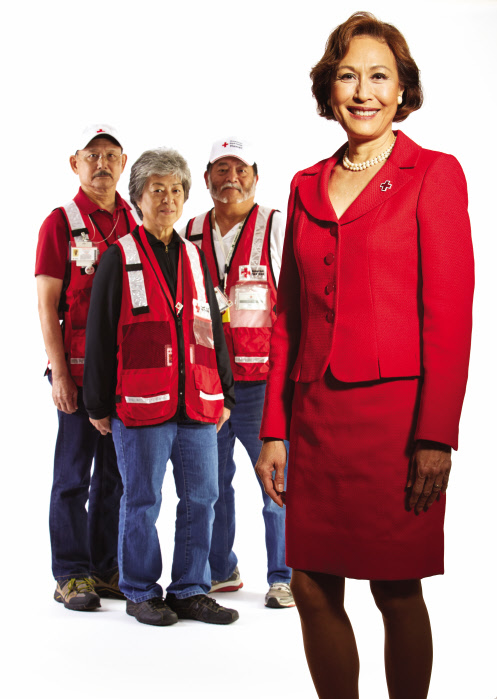
The face of the Hawaii Red Cross is its CEO, Coralie Chun Matayoshi. Like Red Cross founder, Clara Barton, Coralie can’t do everything by herself. She must inspire and lead thousands of volunteers to deliver humanitarian aid to all of us—whenever disaster strikes.
 At the same time that police and fire first responders are called to the scene of a disaster, Red Cross disaster relief volunteers are deployed to assess damage, counsel victims, administer immediate aid and start planning longer-term assistance. Volunteers on Red Cross Disaster Action Teams are on duty 24/7 and average one response every four days. This is humanitarianism at its best: orderly aid, comfort and logistics delivered to disaster victims, behind the scenes. Volunteers are ordinary citizens, just like you and me —with a will to help and skills learned at Red Cross. Most people have no idea how many services Hawaii Red Cross provides to our communities. Veterans and families of active military know Red Cross volunteers who aid service members at Tripler, Schofield, Pearl Harbor and Kaneohe. Some deployed soldiers have even had the Red Cross track them down in the field to deliver news of a family emergency at home — or arrange to get them home for a funeral. Lifeguards and moms may not know about how Red Cross helps our military personnel, but they do know about Red Cross swim instruction classes and certification programs. Business owners send their employees to Red Cross first aid and CPR training. Puna residents affected by Hurricane Iselle received aid. Recently, Red Cross volunteers had a shelter on standby for residents needing to evacuate their homes due to the threat of the Puna lava flow. In fact, at every flash flood, tsunami, earthquake, or house fire across our state, Red Cross volunteers are providing disaster relief to people in need. Every day, they are prepared to scale up and to deliver the amount and kind of aid required — exactly when it is needed. Volunteers from Hawai‘i deploy to other states — Hurricane Sandy in New Jersey, Hurricane Katrina in New Orleans . It’s how they train for large disasters at home. When Hawai‘i gets hit, American Red Cross volunteers from the mainland will deploy here to help us.
At the same time that police and fire first responders are called to the scene of a disaster, Red Cross disaster relief volunteers are deployed to assess damage, counsel victims, administer immediate aid and start planning longer-term assistance. Volunteers on Red Cross Disaster Action Teams are on duty 24/7 and average one response every four days. This is humanitarianism at its best: orderly aid, comfort and logistics delivered to disaster victims, behind the scenes. Volunteers are ordinary citizens, just like you and me —with a will to help and skills learned at Red Cross. Most people have no idea how many services Hawaii Red Cross provides to our communities. Veterans and families of active military know Red Cross volunteers who aid service members at Tripler, Schofield, Pearl Harbor and Kaneohe. Some deployed soldiers have even had the Red Cross track them down in the field to deliver news of a family emergency at home — or arrange to get them home for a funeral. Lifeguards and moms may not know about how Red Cross helps our military personnel, but they do know about Red Cross swim instruction classes and certification programs. Business owners send their employees to Red Cross first aid and CPR training. Puna residents affected by Hurricane Iselle received aid. Recently, Red Cross volunteers had a shelter on standby for residents needing to evacuate their homes due to the threat of the Puna lava flow. In fact, at every flash flood, tsunami, earthquake, or house fire across our state, Red Cross volunteers are providing disaster relief to people in need. Every day, they are prepared to scale up and to deliver the amount and kind of aid required — exactly when it is needed. Volunteers from Hawai‘i deploy to other states — Hurricane Sandy in New Jersey, Hurricane Katrina in New Orleans . It’s how they train for large disasters at home. When Hawai‘i gets hit, American Red Cross volunteers from the mainland will deploy here to help us.
The American Red Cross Mission Statement:
To prevent and alleviate human suffering in the face of emergencies, by mobilizing the power of volunteers and the generosity of donors.
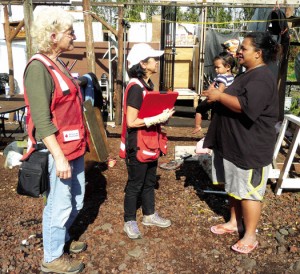
At the head of this volunteer humanitarian organization is a woman with a heart for people. Nearly twelve years ago, Coralie Matayoshi and her husband moved back to Hawai‘i from Washington, DC, where Coralie was engaged in antitrust litigation at the U.S. Department of Justice. “I wanted to raise my children in Hawai‘i, but I never thought I would end up at Red Cross.” She went into a law practice in Honolulu, and served as the Executive Director of the Hawaii State Bar Association for 13 years. Later, in 2004, when the Red Cross CEO position came up, she put all that aside to follow a deep concern for people in need. “… It was their mission that got my attention,” she says, with a smile.
A WAY OF BEING
What drew this highly skilled attorney away from the law? Was it something inside Coralie — a deep yearning that desired a bigger reward than stature and big money?
At the core of all humanitarian organizations is something called altruism, defined as: “unselfish regard for or devotion to the welfare of others.” Even if you never heard this word before, you may recognize the feeling — a desire to help others that goes beyond family ties and friendships — an inborn will to help anyone in need.” It is the stuff that drives career firefighters, police, EMTs, lifeguards, nurses and ER physicians. It causes strangers to jump into the sea to help a drowning person. Although the law helps people, Coralie saw in Red Cross a direct way to help thousands of people in need and to lead an organization of like-minded humanitarians. At Red Cross, nobody actually talks about this — they all get it. That’s because they are a band of altruistic people.
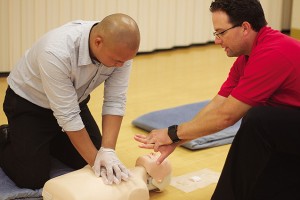 When Coralie talks about her volunteers, she smiles. She shares their unique motivation and understands how volunteers “designate themselves to the job,” as she says. People who call to inquire or walk in to sign up at Red Cross really want to help people. They are responding to their altruistic feelings, and Coralie says her job is to find them the right job for their skills or to teach them new skills so they can effectively provide humanitarian aid. Some will become case workers. Others will become instructors who teach the public to save themselves in future disasters. We decided to let Coralie tell you first hand what Red Cross does, and to take a look at the many volunteer training opportunities at Red Cross.
When Coralie talks about her volunteers, she smiles. She shares their unique motivation and understands how volunteers “designate themselves to the job,” as she says. People who call to inquire or walk in to sign up at Red Cross really want to help people. They are responding to their altruistic feelings, and Coralie says her job is to find them the right job for their skills or to teach them new skills so they can effectively provide humanitarian aid. Some will become case workers. Others will become instructors who teach the public to save themselves in future disasters. We decided to let Coralie tell you first hand what Red Cross does, and to take a look at the many volunteer training opportunities at Red Cross.
GM: What do you want our readers to know about Red Cross?
CM: “Most people only know a little of what Red Cross does. Besides having volunteers on call 24/7 to respond to disasters like home fires, we train the public for disaster preparedness. We manage evacuation shelters and provide services such as bulk distribution of first aid supplies, water and food. We provide meal service to those in need during the aftermath of major disasters. These are big operations, and our many volunteers must be trained in advance. We also train the public in first aid and cardiopulmonary resuscitation (CPR). We teach swimming, and certify swimming instructors. Although we are not part of the military, we provide humanitarian aid to military families and patients at military hospitals, like Tripler Army Medical Center. Our volunteers deliver more disaster mental health counseling than any other organization. We are mental health counseling experts.
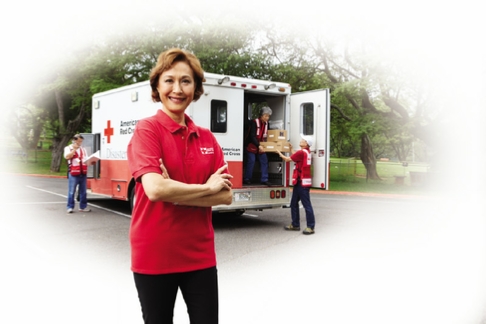
GM: So Red Cross needs a lot of volunteers?
CM: “Hawai‘i is the most isolated population on the face of the Earth,” says Matayoshi. “My goal is to increase our volunteer base, so we are prepared for epidemics, large storms and tsunami that can strike statewide. We have been fortunate in recent years that tsunami did not hit Hawai‘i directly, but it is just a matter of time. We have many jobs, and volunteers can pick what they feel most motivated to assist in. If they want to learn new skills, we can train them. Many of our volunteers are retired, so their schedules easily accommodate training programs and round-the-clock duty shifts as caseworkers, drivers, damage assessors, team leaders or telephone dispatchers in big disasters. I think it’s important for your readers to know that we do not receive any federal or state funding for disaster operations. We ask for donations from the community — like every other non-profit. We also leverage donor dollars wisely through the work of our dedicated volunteers.
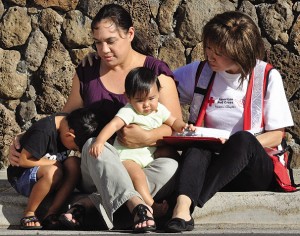 GM: What is involved in managing a disaster shelter?
GM: What is involved in managing a disaster shelter?
CM: During Iselle, 32 evacuation shelters housed 2,041 people in one night. In the aftermath, two hundred Red Cross workers (188 volunteers) provided meals, cots, shower facilities and cell phone charging stations to displaced Puna residents. They distributed comfort kits, cleanup kits, coolers of ice, flashlights, trash bags, tarps and batteries to those in need. Damage to homes was assessed and those who could not return home received help to find alternative housing after the storm. Volunteer nurses did health assessments and trained mental health workers provided crisis counseling for 950 persons during the nine days that shelters were open.
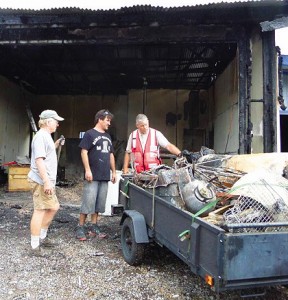 GM: You said “home fires.” How do you aid victims of a home fire?
GM: You said “home fires.” How do you aid victims of a home fire?
CM: Our disaster team recently followed the fire department into a home that had burned to the ground. Red Cross caseworkers are trained to assess damage to help victims communicate with their insurance carrier. They also help arrange temporary housing, food and clothing. Red Cross volunteers are trained to expertly assist victims of disasters to think through the next steps for them and their family, to provide comfort and to connect families to other agencies who can provide long-term aid. After the fire trucks left, the victims were not alone. Red Cross was there.
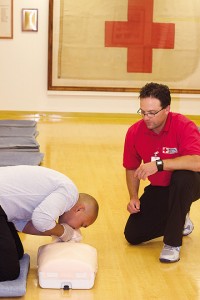
GM: We understand that Red Cross manages the volunteer program at Tripler Army Medical Center.
CM: Red Cross volunteers work in 46 different departments and wards at Tripler. Some are professional volunteer nurses, doctors, pharmacists and office workers. Some even bring their pet “therapy dogs” to visit patients and service members. Red Cross hospital volunteers are bringing comfort and aid to patients and their families every day. Together with volunteers at Schofield, Pearl Harbor, and Kaneohe, Red Cross volunteers donate 35,000 hours per year.
GM: Is community disaster preparedness a big part of your operation?
CM: Every year Red Cross teaches 20,000 people courses in first aid, nurse aid, family caregiving, babysitting, water safety, lifeguard and pet first aid training. Now many of these lifesaving tips are available as apps for your smart phone, so that your first aid or CPR facts are a touch away all times.
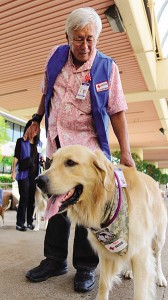
GM: Tell us more about Disaster Mental Health Counseling.
CM: For almost every major disaster in Hawai‘i, Red Cross volunteers have been counseling families who have lost loved ones, helping people deal with trauma, fear, anger and melancholy so they can then move on with their lives. At Pearl Harbor, Hilo tsunami, New Year’s and Manoa floods, Sacred Falls landslide, Ehime Maru, Hawai‘i Island earthquake, Kaloko dam burst — Red Cross was there. Hawaii Red Cross volunteers were in American Samoa, traveling from village to village, helping survivors of the 2009 tsunami. I was deployed to New Orleans in 2005 for Hurricane Katrina. Deploying our volunteers brings back priceless experience and training that one day will help us right here in Hawai‘i.
BECOMING A RED CROSS VOLUNTEER
![]() Do you have what it takes? This interview gave us a very different view of the American Red Cross in Hawai‘i. The message is pretty clear: we need to prepare for disasters. When trouble hits, trained volunteers have to swing into action to help the victims. If this story speaks to you — you may have the heart of a Red Cross volunteer. Or maybe now you understand the benefits of investing in the future of Red Cross. When we help Red Cross Hawaii meet their mission, we help ourselves and our families.
Do you have what it takes? This interview gave us a very different view of the American Red Cross in Hawai‘i. The message is pretty clear: we need to prepare for disasters. When trouble hits, trained volunteers have to swing into action to help the victims. If this story speaks to you — you may have the heart of a Red Cross volunteer. Or maybe now you understand the benefits of investing in the future of Red Cross. When we help Red Cross Hawaii meet their mission, we help ourselves and our families.
To donate or for more information on volunteer opportunities, visit their website or visit their Headquarters in Diamond Head.
Hawaii Red Cross
4155 Diamond Head Road, Honolulu
808-734-2101 | www.redcross.org/hawaii
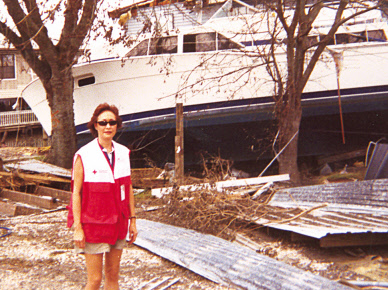
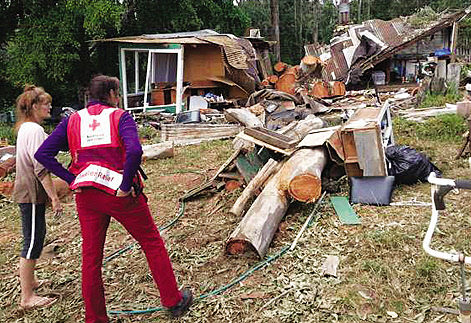
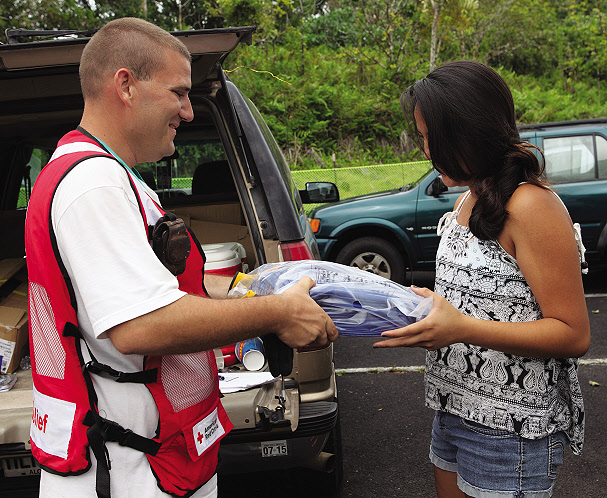


Leave a Reply